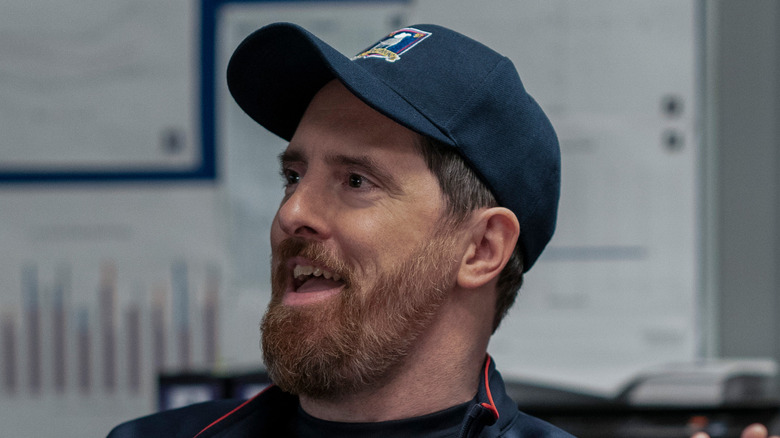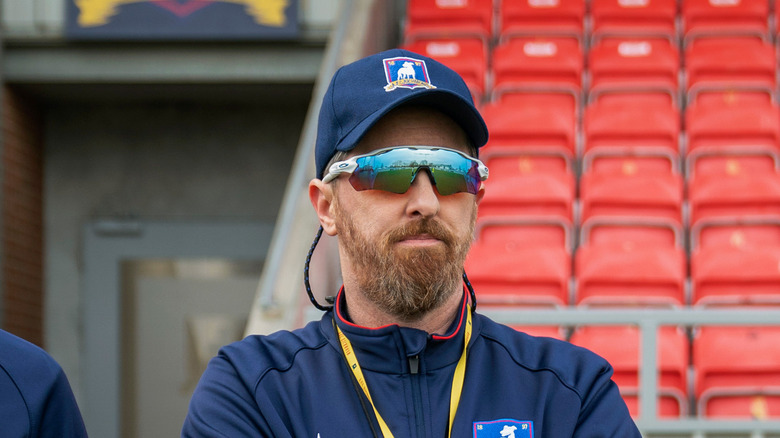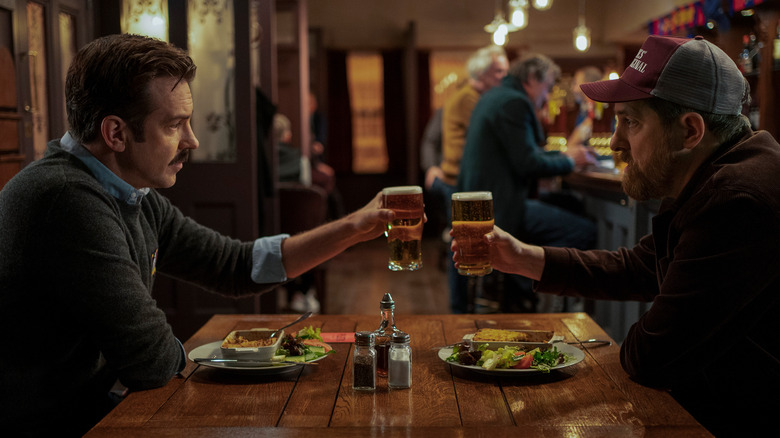Ted Lasso's Brendan Hunt Takes Us Inside The Creative Process For Season 2 - Exclusive Interview
In the dark days of 2020, Apple TV+ brought us an unexpected bright light with the debut of "Ted Lasso," a Jason Sudeikis-led series based on an NBC Sports advertising campaign for Premiere League football in 2013. The show won audiences over with its generally genial tone and cast of eminently likable characters, and has become an awards season darling to boot.
One of those characters is the remarkably taciturn Coach Beard, assistant to the title character. Where Ted Lasso is boisterous and gregarious, Beard is quiet and reserved — except, of course, when he's performing Lady Gaga at a karaoke party. He's brought to life by Brendan Hunt, who's also a producer and writer on the show.
With Season 2 of "Ted Lasso" arriving, we chatted with Hunt about building on Season 1's success and finding compelling drama when everyone's so darn nice.
Brendan Hunt on being Beard on Ted Lasso
Beard's kind of the quiet counterpart to Ted. How do you deal with the challenge of making an impression without saying a lot, especially around other, more gregarious characters?
Yeah. It's just that the logic of Ted's foil being a silent guy, or a less talkative guy, when Ted is so prone to speeches and aphorisms and stuff, it just makes sense. So I just have to do that because that's what serves the piece, and that's what serves how Ted is. So yeah, I just try to always mean what I say as Beard, and hope that it little bit goes a long way.
Beard had a couple of big dramatic moments in Season 1, with his speech to Ted in the pub and then his romantic subplot. Can we expect more from him in Season 2?
Without giving too much away, that romantic subplot continues a little bit. Jane is still around, and Jane and Beard are still just trying to figure it out in their way.
Can we expect any sort of change in his interaction with the team?
Oh, no. Beard still will be the same kind of coach that he's always been, just filling in the gaps where need be, and giving the floor to the most appropriate person to have it, which is usually not him.
Building on Ted Lasso's Season 1 success
It seemed "Ted Lasso" took everyone by surprise last year. How did things change going into producing Season 2, bearing the weight of expectations?
We started writing Season 2 long before Season 1 came out, or long enough anyway that we were able to map out what Season 2 was going to be. We basically knew the story by then, so we were definitely free of any such burden when we were putting this together. And then after that, when we were still writing and the praise was starting to come in, we're all very grateful for it, but I don't think we really let that change anything that we were doing. I mean, we didn't write the first season to be praised, if that makes sense. And so if anything, getting that positive feedback in the middle of getting into the nuts and bolts of writing Season 2 was just kind of a load off, because it allowed us to go, "Okay, this thing that we're doing, that doesn't feel like a typical way of writing a show, we've got to keep doing that. We've just got to trust what we started with because we appear to have struck a vein or something."
"Ted Lasso" made a name for itself as a show that highlights kindness and positivity. Was there any interest in shaking up that formula in the second season?
Well, I don't know that it's a formula per se, it's just that we enjoy ... comedy has gotten very fast, sitcoms especially have gotten very, very fast over the last few years or so, and we enjoy taking our time. And I think that's a, I mean, it's a literal change up, to use the baseball term. And so we just, that round of good reviews and stuff, it was like, "Okay, we can still do this timing. This timing feels right. This timing feels English, or this timing feels like you're in England." Which is something that we wanted to honor as much as possible. So yeah, I think after one season, it's not yet time to pull apart what you're doing. A second season's a time to say, "Okay, that thing that we've been doing now, let's do it even better." In terms of what feels better at the time. And then Season 3 will be in black and white and we're just going to speak German.
Is it difficult creating dramatic tension when all the characters are so likable?
Hmm. Interesting. I guess it just forces you to find different types of antagonists. And a lot of times, especially in this season, the antagonists are ourselves. We have antagonists within us, and we have situational antagonism to deal with. But yeah, you don't have to pit your characters against each other to have conflict of a different, perhaps richer kind.


